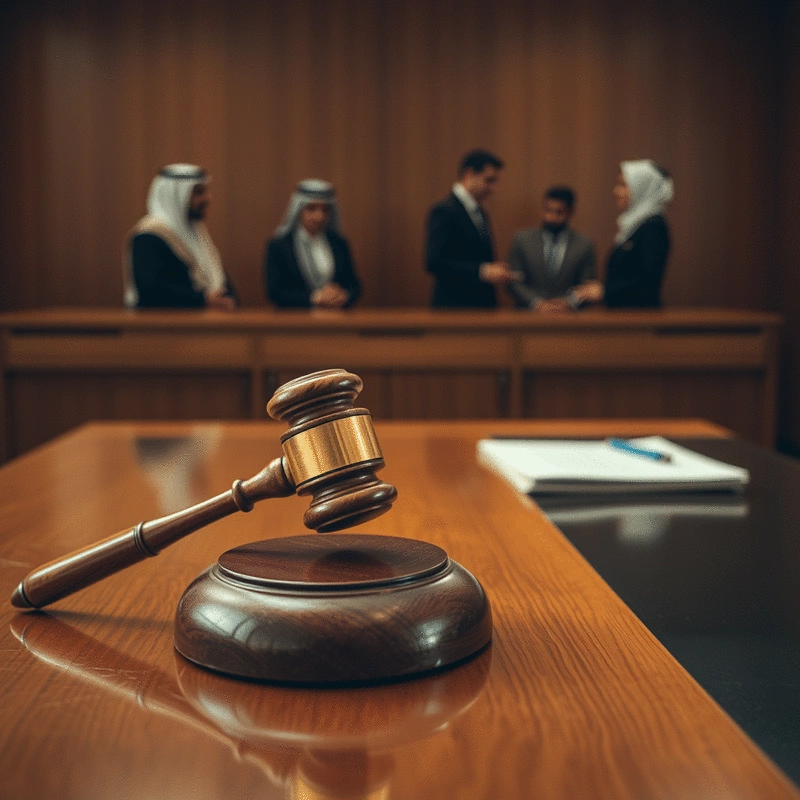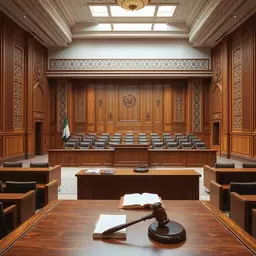Plea Bargains in UAE Criminal Cases

In the complex landscape of the UAE's criminal justice system, understanding plea bargains is essential for anyone facing legal challenges. These agreements can lead to favorable outcomes, but they come with significant implications. Seeking insight into this intricate process could be the key to navigating your legal journey successfully.
What You Will Learn
- Plea bargains simplify legal proceedings, potentially leading to reduced charges and shorter sentences for defendants.
- Understanding the legal framework of the UAE Criminal Code is crucial for making informed decisions regarding plea negotiations.
- Defendants gain control over their legal outcomes through plea bargains, allowing for quicker resolutions and reduced time in custody.
- Articles 361 and 362 of the UAE Criminal Procedure Law outline the formal processes and requirements for plea agreements.
- Plea bargains in the UAE differ from those in common law jurisdictions, emphasizing structured procedures and judicial approval.
- Judicial discretion plays a significant role in plea bargaining outcomes, with judges possessing the authority to accept or reject proposed agreements.
- The importance of engaging knowledgeable legal professionals cannot be overstated, as they can help navigate the complexities of plea bargaining.
Key Features of Plea Bargains in UAE Criminal Procedure Law
Selected insights into the plea bargaining process showcasing the essential elements and differences in legal systems. For a broader understanding of legal procedures, consider exploring how to navigate criminal cases in Dubai.
UAE Legal Framework
- Articles 361-362 govern plea bargaining.
- Structured approach ensures fairness and transparency.
Comparison with Common Law
- UAE: More structured, requires court approval.
- Common Law: Greater flexibility in negotiations.
Judicial Discretion
- Judges can accept/reject plea agreements.
- Sentencing guidelines provide a framework but are not guarantees.
Benefits of Plea Bargains
- Reduction of charges and shorter sentences.
- Less public exposure and quicker resolutions.
Fundamentals of Plea Bargains in UAE Criminal Defense Cases
Understanding plea bargains in the UAE is crucial for anyone involved in the criminal justice system. These agreements can significantly affect the outcome of a case and often lead to reduced sentences or lesser charges. So, what exactly are plea bargains in the UAE context? They are agreements between the defendant and the prosecutor where the defendant pleads guilty to a lesser charge or receives a lighter sentence in exchange for waiving their right to a trial. This process simplifies legal proceedings, saving time and resources for both parties.
Defining Plea Bargains: An Overview in the UAE Context
Plea bargains in the UAE are rooted in the legal framework established by the UAE Criminal Code and the Federal Penal Law. In essence, these bargains allow for negotiations between the defense and prosecution, providing an opportunity for defendants to achieve more favorable outcomes. While the concept might be similar to other legal systems, the specifics can vary significantly due to the UAE's unique legal landscape. For instance, plea bargains are generally more common in cases involving non-violent offenses.
- Reduction of charges
- Shorter sentences
- Less public exposure
By accepting a plea bargain, defendants may avoid the uncertainty and stress that often accompany a trial. This can be particularly beneficial in the UAE, where cultural and social implications of legal matters are significant. Engaging with knowledgeable legal experts, like those at UAE Criminal Defense Insights, can make a substantial difference in understanding these agreements.
Importance of Understanding Plea Bargains for Defendants
For defendants, grasping the implications of plea bargains is essential. It not only helps in making informed decisions but also provides a sense of control over the legal process. Knowing what is at stake can lead to better negotiations and outcomes. Furthermore, a plea bargain can often lead to a quicker resolution, allowing defendants to move on with their lives sooner. For detailed insights on protecting your rights, learn more about legal rights in UAE arrests.
- Control over legal outcomes
- Potential for reduced time in custody
- Opportunity to avoid trial
Have you ever thought about how a plea bargain could affect your case? It's crucial to weigh the benefits against any potential drawbacks. For example, accepting a plea may include admitting guilt, which can have lasting repercussions beyond the immediate legal consequences. Thus, reaching out to experienced professionals can help navigate these tricky waters.
Legal Framework: Understanding the UAE Criminal Code and Federal Penal Law
The UAE Criminal Code and Federal Penal Law provide the structure within which plea bargains operate. These legal texts set forth various regulations that govern how plea agreements are reached and enforced. A clear understanding of this framework can empower defendants to make informed choices regarding their cases.
- Key articles related to plea bargaining
- Provisions for negotiation procedures
- Limitations based on the nature of the offense
Moreover, the laws surrounding plea bargains are designed to ensure fairness within the judicial system. By familiarizing oneself with these statutes, defendants can better advocate for their rights, ensuring that they do not inadvertently waive important legal protections. At UAE Criminal Defense Insights, we are dedicated to helping individuals understand these complexities, providing them with the knowledge necessary to navigate their legal journey successfully.
Pro Tip
When considering a plea bargain, it's essential to engage a legal professional who understands the intricacies of UAE law. A knowledgeable attorney can provide insights into potential outcomes, ensuring you make an informed decision that aligns with your best interests.
Key Features of the Bargaining Plea under UAE Criminal Procedure Law
Understanding the key features of plea bargains under UAE Criminal Procedure Law is crucial for anyone navigating the legal system. The articles that govern these procedures provide essential insight into how the process works. Let’s delve into the specifics outlined in Articles 361 and 362 of the law, which lay the foundation for plea bargaining in the UAE.
Legal Framework: Articles 361-362 Explained
Articles 361 and 362 of the UAE Criminal Procedure Law present a structured approach to plea bargaining. These articles establish a framework that allows defendants to negotiate their pleas, enabling them to potentially reduce their charges or receive a lesser sentence.
Specifically, Article 361 allows the court to accept a plea bargain when the accused admits guilt and shows willingness to cooperate with the legal process. Article 362 explains the procedures involved in formalizing these agreements, including the need for court approval. This ensures that the rights of all parties are protected throughout the process.
- Article 361: Governs the acceptance of plea bargains.
- Article 362: Outlines the procedural steps for formalizing agreements.
- Key Requirement: Cooperation from the accused is essential.
Settlement Mechanism for Offenses with Up to 36 Months Imprisonment
One notable feature of the plea bargaining process is its application to offenses with a potential imprisonment of up to 36 months. This mechanism is designed to expedite justice and alleviate court congestion. By allowing defendants to settle their cases through plea bargains, the legal system can focus resources on more serious offenses.
This mechanism benefits all parties involved, as it can lead to quicker resolutions and a more efficient use of judicial resources. However, defendants must understand the implications of entering into such agreements, as they can result in lasting legal consequences.
Differences Between UAE and Common Law Jurisdictions
The plea bargaining process in the UAE differs significantly from that in common law jurisdictions such as the US and UK. In the UAE, the legal framework is rooted in civil law principles, which influences how plea bargaining is conducted.
- Civil Law System: Plea deals are more structured and often require court approval.
- Common Law System: Provides greater flexibility for negotiations between defense and prosecution.
- Outcome Certainty: UAE's system may offer less predictability in the outcomes of negotiations.
How Civil Law System Influences Plea Bargaining Practices
In a civil law system like that of the UAE, plea bargaining is not as informal as it may be in common law systems. The legal framework emphasizes formal procedures, which can sometimes limit the flexibility of negotiations. This structured approach is intended to ensure fairness and transparency within the justice system.
As a result, understanding these nuances is vital for defendants. It allows them to make informed decisions when considering a plea bargain, ensuring they are fully aware of their rights and obligations during this process.
Comparison with US and UK Systems
When comparing the UAE’s plea bargaining practices with those in the US and UK, several differences emerge:
- Negotiation Flexibility: The US and UK systems may allow for informal negotiations, whereas the UAE requires more formal procedures.
- Judicial Approval: In the UAE, plea bargains must be approved by the court, ensuring that legal standards are met.
- Transparency: The civil law approach seeks to maintain a level of transparency that might differ from common law practices.
Judicial Discretion and Sentencing Guidelines in Plea Bargains
Judicial discretion plays an important role in plea bargaining outcomes. In the UAE, judges have the authority to accept or reject plea bargains based on the specifics of each case. This discretion ensures that justice is served while also considering the circumstances surrounding the offense.
Sentencing guidelines provide a framework within which judges operate, but the ultimate decision lies in their hands. Defendants should understand that even if a plea bargain is reached, the judge’s decision is final, making it essential to have a knowledgeable attorney advocating on their behalf. For more on this, explore criminal defense strategies in UAE.
- Understanding Judicial Discretion: Judges can influence plea outcomes significantly.
- Importance of Sentencing Guidelines: They offer a baseline but don't guarantee outcomes.
- Role of Defense Attorneys: Essential in negotiating terms that align with judicial expectations.
Frequently Asked Questions About Plea Bargains in the UAE
Here are some common questions about plea bargains in the UAE criminal justice system:
- What is a plea bargain in the UAE?
A plea bargain in the UAE is an agreement between the defendant and the prosecutor where the defendant pleads guilty to a lesser charge or receives a lighter sentence in exchange for waiving their right to a trial. This process is governed by specific articles in the UAE Criminal Procedure Law. - Which articles of UAE law govern plea bargains?
Plea bargains in the UAE are primarily governed by Articles 361 and 362 of the UAE Criminal Procedure Law. These articles outline the framework for accepting and formalizing plea agreements, requiring court approval. - How do UAE plea bargains differ from those in common law countries?
In the UAE's civil law system, plea bargains are more structured and require formal court approval, emphasizing fairness and transparency. In contrast, common law jurisdictions often allow for greater flexibility and informal negotiations between defense and prosecution. - Can a judge reject a plea bargain in the UAE?
Yes, judges in the UAE retain significant judicial discretion and have the authority to accept or reject plea bargains based on the specifics of each case. Their decision is final, even if an agreement has been reached between the defense and prosecution. - What are the benefits of a plea bargain for a defendant in the UAE?
Plea bargains can lead to reduced charges, shorter sentences, less public exposure, and quicker resolutions, allowing defendants to avoid the uncertainty and stress of a prolonged trial.
In conclusion, navigating the plea bargaining process in the UAE requires a solid understanding of the legal framework and the distinctions from other jurisdictions. As someone deeply invested in this topic, I encourage you to explore these aspects further, as they are crucial in making informed decisions about your legal options. If you have any questions or need assistance, feel free to reach out to us at UAE Criminal Defense Insights. We're here to help you navigate your legal journey! For a closer look at real-world applications, consider analyzing criminal defense cases in UAE.
Recap of Key Points
Here is a quick recap of the important points discussed in the article:
- Definition of Plea Bargains: Plea bargains are agreements between the defendant and prosecutor that can lead to reduced charges or lighter sentences.
- Importance for Defendants: Understanding plea bargains empowers defendants to control legal outcomes and can lead to quicker resolutions.
- Legal Framework: The UAE Criminal Code and Federal Penal Law outline the procedures and limitations surrounding plea bargains.
- Articles 361-362: These articles establish the framework for negotiating plea bargains and require court approval.
- Differences with Common Law: The UAE’s civil law system enforces structured procedures, contrasting with the flexibility of common law jurisdictions.
- Judicial Discretion: Judges in the UAE hold the power to accept or reject plea bargains based on the specific case circumstances.
Popular Posts
 Understanding the intricacies of the criminal defense trial in the UAE can significantly impact your
Understanding the intricacies of the criminal defense trial in the UAE can significantly impact your
 Understanding the complexities of the legal system can be daunting, especially when facing criminal
Understanding the complexities of the legal system can be daunting, especially when facing criminal
 Understanding your legal rights is not just important; it's essential for anyone navigating the comp
Understanding your legal rights is not just important; it's essential for anyone navigating the comp
 As financial crimes continue to evolve, understanding their implications is crucial for navigating t
As financial crimes continue to evolve, understanding their implications is crucial for navigating t
